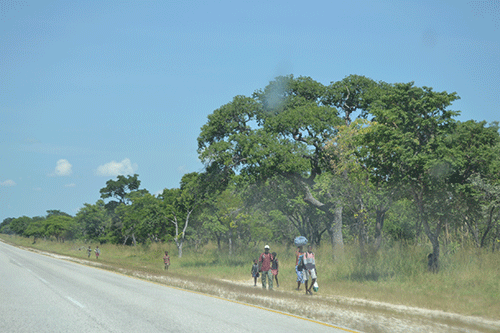BWABWATA – Although the government has established decentralisation programmes to bring development and services closer to the grassroots levels, the marginalised communities within the Bwabwata National Park feel little has been done for them in terms of development and provision of services.
New Era gauged views from some of the Khwe youth living within the park on their views on how far Namibia has come as a nation in terms of development and bringing services closer to the people especially those in rural areas.
“Well, since we are confined to reflecting within the region, allow me to say some parts of the country and or some communities have benefited and enjoyed the fruits of independence more than others,” expressed a Khwe youth, Dennis Munyingwa.
Munyingwa feels although the government established a decentralisation programmes to bring development and services closer to communities, for the marginalised communities in Bwabwata National Park, little has been done in terms of development and provision of services.
Some of the challenges the youth highlighted are the lack of potable water for most settlements and reliable sources of water that could be utilised for income generation and food production activities such as green scheme projects to support their families.
They also expressed that children are still attending classes under makeshift structures which are unfavourable during certain weather conditions, thus causing an unconducive teaching and learning environment for both teachers and learners.
“It also poses danger to pupils and staff since these structures are dilapidated. We also have many children walking approximately 30 kilometres a day to attend classes, which is approximately 150 kilometres from Monday to Friday. This simply means access to basic education is not provided,” Booysen Rista expressed.
Another complaint is that the nearest youth centre and vocational institute is situated over 200 kilometres away from the community.
According to them, there is no access to radio communication and reliable network coverage to access important information regarding opportunities for the youth like it is in other parts of the region.
The issue of electricity as an important infrastructure for development has been a dream for the marginalised communities in Bwabwata.
However, there is an ongoing project to electrify all schools in Bwabwata.
“As per the information at hand, it is exclusively earmarked for schools and not the community. Electricity could potentially mitigate human-wildlife conflict which is a common cause of problems in the Bwabwata,” Munyingwa argues.
Equally, another youth, Robert Nadia said for such a significant number of residents within the park, there is only one clinic, at Chetto, which caters to all despite some members of the community having to travel long distances to access health facilities.
“The nearest hospital is at Katima Mulilo which is nearly 250 kilometres away and it caters for the whole region,” Nadia indicated.
On the other hand, the marginalised youth are grateful that the government initiated a socio-economic programme, following a Cabinet decision in 2005, intended to uplift the livelihoods of people from the San communities.
Eventually, in 2009, the programme included the Ovatue, and Ovatjimba communities, respectively.
Amongst other equally important pillars of this programme include educational support, which funds learners and students from these communities at all levels of education, being primary to tertiary level.
“We, therefore, would like to urge fellow youths to make use of this opportunity wisely. The government alone will not solve all our problems, we need to be in the forefront, fully devoted to changing our lives.”
Furthermore, the youth reflected on how much Namibia has done as a nation in terms of economic freedom as opposed to political freedom.
“Politically, we have been given the right to cast our votes, participate in political activities but do we have economic freedom? What can we do to reclaim ownership of our resources as a nation? At the moment, our government is being paid peanuts in the name of tax. The majority of shares are owned by these multinational companies. Our raw materials are being depleted and transported overseas on our watch, and they come back as very expensive finished products,” Munyingwa remarked.
They feel it is time for Namibian youth to engage in meaningful dialogue and advocacy to attain economic independence.
“We also would reflect on our heroes and heroines whose blood waters our freedom and continue to show them our respect and love. We would want to spend time with the forgotten heroes from the San communities who equally fought for the liberation of Namibia, which is an issue we believe needs urgent government intervention,” he reacted.
Nonetheless, the youth pledged to continue giving respect to liberation icons, learn from them and pick up a strategic fight in the endeavour for economic freedom.
-anakale@nepc.com.na


